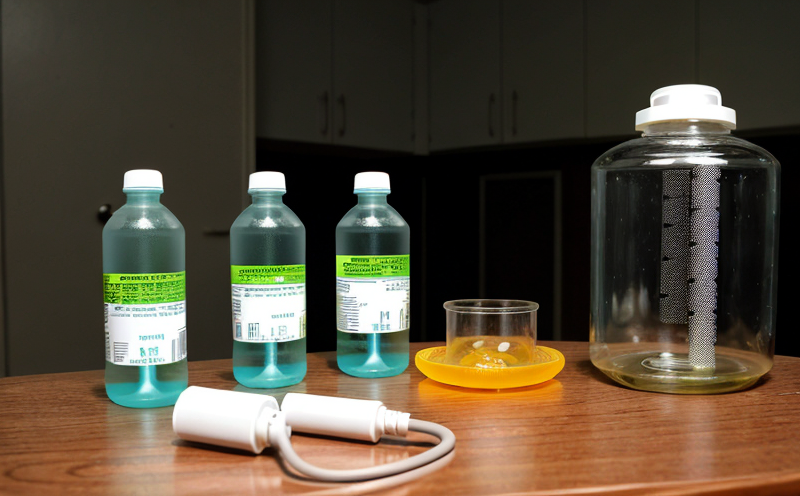ASTM D7284 Radium 228 Determination Test in Water
The ASTM D7284 standard provides a comprehensive method for determining radium-228 concentrations in water samples. This test is crucial for ensuring compliance with regulatory requirements and safeguarding public health, especially in areas where groundwater or surface water may be contaminated by naturally occurring radioactive materials.
Radium-228 is a product of the uranium series that can migrate through soil into groundwaters. Once it reaches drinking water sources, its presence poses potential health risks, particularly due to its alpha-emitting properties. The ASTM D7284 method uses liquid scintillation counting (LSC) or other suitable techniques for accurate detection.
The testing process involves several critical steps: sample collection, preservation, and preparation; instrumentation setup; and final analysis. Proper sampling is essential as water dynamics can significantly influence radium distribution. Samples are typically collected from wells or surface water sources and then preserved with nitric acid to prevent contamination.
Instrumentation used in this test includes liquid scintillation counters (LSC) capable of detecting low levels of alpha radiation, ensuring precise quantification of radium-228. The method's accuracy is further enhanced by using known standards for calibration and quality control checks throughout the process.
The acceptance criteria are stringent to ensure reliable results. Results must meet specified limits set by regulatory bodies such as EPA or WHO guidelines on safe levels of radium in drinking water. Compliance with these standards helps protect public health and ensures that water supplies remain safe for consumption.
Understanding the implications of radium-228 contamination is vital, especially given its long half-life and potential to bioaccumulate in organisms. Regular monitoring through ASTM D7284 tests can help identify trends over time, allowing proactive measures to be taken before exceedance levels are reached. This proactive approach not only maintains compliance but also contributes positively towards environmental stewardship.
Given the importance of this test in ensuring safe water supplies, it's essential for stakeholders like quality managers, compliance officers, and R&D engineers involved in water treatment processes to stay informed about current standards and best practices. By adhering strictly to procedures outlined by ASTM D7284, laboratories can provide accurate results that contribute significantly towards maintaining public health.
Properly conducted ASTM D7284 tests form a cornerstone of effective radium management strategies within the water & wastewater sector. They enable organizations to make informed decisions regarding treatment processes and resource allocation, ultimately leading to safer drinking water for communities worldwide.
Applied Standards
| Standard | Description |
|---|---|
| ASTM D7284-19 | This standard specifies the procedures for determining radium-228 in water using liquid scintillation counting (LSC). |
| EPA 1313 | The U.S. Environmental Protection Agency's method for measuring radium isotopes. |
| WHO Guidelines | World Health Organization recommendations on safe levels of radium in drinking water. |
| ISO 9001:2015 | Absence of direct application, but aligns with quality management systems used by laboratory services. |
Why Choose This Test
The ASTM D7284 radium-228 determination test offers numerous advantages that make it a preferred choice for various sectors, including environmental protection agencies and private water treatment facilities. Firstly, its robust methodology ensures accurate detection of even trace amounts of radium isotopes in complex matrices like groundwater or surface waters.
Secondly, compliance with this standard is mandatory under several international regulations aimed at protecting human health from radioactive contaminants. By adhering to ASTM D7284 guidelines, laboratories demonstrate their commitment to maintaining high standards of accuracy and reliability in analytical services provided.
Moreover, the test results generated using ASTM D7284 are widely accepted by regulatory authorities worldwide due to its scientific rigor and reproducibility. This acceptance lends credibility to any findings reported based on this method, thereby enhancing trust among stakeholders.
In terms of operational efficiency, implementing ASTM D7284 allows organizations to streamline their quality assurance programs effectively. Regular testing helps identify potential issues early on, enabling timely corrective actions before they escalate into larger problems requiring extensive remediation efforts.
Lastly, the comprehensive nature of ASTM D7284 ensures that all relevant factors affecting radium concentration are accounted for during analysis. This thorough approach guarantees reliable outcomes which can be confidently used in decision-making processes related to water quality management initiatives.
Quality and Reliability Assurance
Ensuring the highest levels of accuracy, precision, and reliability is paramount when conducting ASTM D7284 radium-228 determination tests. Our laboratory adheres strictly to established protocols outlined in this standard to deliver dependable results every time.
A key aspect of our quality assurance process involves rigorous calibration procedures for all instrumentation used during testing. This includes periodic verification against certified reference materials and participation in proficiency programs recognized by relevant regulatory bodies. These measures help maintain the integrity of analytical data throughout each step of sample processing from initial collection through final analysis.
We also employ strict quality control practices such as duplicate sampling, spiked samples, and internal audits to monitor consistency across all projects undertaken using ASTM D7284. By adhering meticulously to these stringent standards, we guarantee consistent and trustworthy results that meet or exceed client expectations.
Furthermore, our team of experienced scientists maintains continuous education on the latest advancements within the field of radioactivity measurement techniques. Regular participation in workshops and training sessions ensures they stay updated with emerging trends and technologies, allowing us to offer innovative solutions tailored specifically for your needs.
At our core, we believe that transparent communication is vital in fostering trust between clients and service providers. Therefore, along with delivering accurate test results promptly, we provide detailed reports explaining methodologies employed and any observed variations from expected values. This level of transparency helps build long-term relationships based on mutual respect and understanding.





